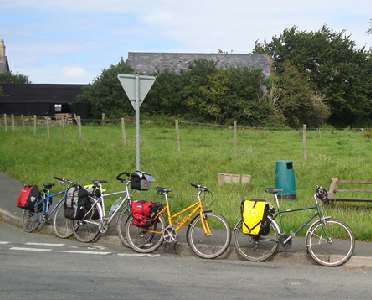More information about donations to cyclecamp here.
More information about donations to cyclecamp here.

Cyclecamp resource page 009

We’ve all agreed so far that there’s at least one thing you need for cycle camping and that’s a bike! Getting the right bike for cycle camping is the first step but there’s more freedom to choose than you might think - and you probably already have the right bike!
But that is where most agreement ends - the best type of bike for cycle camping causes endless discussion and argument. Some people swear by a very light road bike that will carry them and their small amount of gear over long distances; others will insist on a heavy duty off-roader that will take them along the bridleways and towpaths through thick mud while carrying half a ton of camping equipment.
This only goes to show that it is more a matter of where you are going, over what kind of tracks and roads and how much you want to carry. But for the purposes of this resource page, we are going on focus on three key factors:
1. The ability to carry luggage: this means being able to take a rear rack. It almost always rules out a full suspension bike and high-end road bikes also struggle (though it’s not impossible).
2. Strong tyres and wheels that won’t collapse under the weight of your tent and cooking pots - that’s at least 32 spokes and ideally 36 - so start counting!
3. A bike that has the low gears that will take you and your panniers up a steep hill.
There’s lots of room for different bikes in that scenario. But three bikes stand out as ideal and were almost invented for the job:
1. A standard touring bike (with either 700c or 26” wheels).
2. A trekking bike.
3. An old-fashioned mountain bike or hybrid.
That covers a lot of bikes so cycle camping is already proving itself as something that doesn’t need expensive specialist gear – in fact the bike you already have and like is probably going to do the job just fine! Let’s look at the three bikes:
Touring bikes live up to their name: they have a comfy, strong but light frame, good sized wheels taking wide tyres (usually 32mm), brazed-on points that you screw the rack to and low gears that will comfortably carry you over the crest of most hills. These gears by the way usually have 28 teeth on the smallest front chain wheel (the “cogs at the front”) while the largest rear sprocket (the “cogs at the back”) has 32. If you can get the teeth at the front down to 24 or even 22 that’s even better. Touring bikes don’t come cheap: strength and lightness come at a price so expect to pay about £600 up to about £1500 after which they tend to be custom made.
Trekking bikes are a wonderful combination of old fashioned town bike and continental tourer got up to go places. More laid back than a touring bike but still with low gears, 700c wheels and a rear rack, they are ideal for lower mileage cycle camping at a leisurely pace. Many have wider tyres too – up to 38mm for even greater comfort.

Mountain bikes were ideal cycle campers: strong, well tyred and with lusciously low gears

Mountain bikes without suspension are few and far between these days and their load carrying ability is therefore much reduced. But in their old state they were ideal cycle campers: strong, well tyred and with lusciously low gears – ideal for both tackling a muddy towpath and getting you up steep hills fully loaded. Hybrid bikes (not cross bikes) fill the gap and also make ideal cycle campers. Cross bikes will squeak in as lightweight cycle campers
While a trip to your local bike shop may not offer many touring bikes, there should be trekking bikes to see and a hybrid or two. £300 should set you up with a new bike for a short trip. If your budget is really stretched, have a look on ebay for a huge range of hybrid and trekking bikes: many are from excellent makers and good brands, often selling for about £80 – £100 as they lack the street credibility of top end road bikes and more aggressive mountain bikes.
But don’t worry about your image - a well-loaded hybrid has more kudos than any amount of suspension and carbon (in our view of course!)
So the right bike for cycle camping doesn’t require shed loads of cash – what it does need is a cool head in the buying department and a little ingenuity. The real test will be of you while the bike will persevere like a grumbling but utterly reliable old mule. Go get that bike because it will be your friend and companion through the days ahead!

cyclecamp
the joined up cyclecamping network